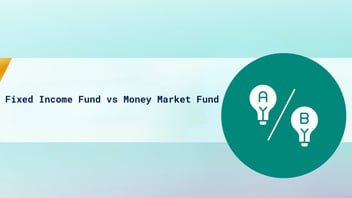
Are Money Market Funds Safe? A Look at the Risks and Advantages
Author Taiwo Temitope-Adesope
Money market funds have become an increasingly popular option among Nigerian investors seeking relatively safe places to park their money. Offering slightly higher returns than traditional savings accounts, these funds invest in short-term government and top-rated corporate debt instruments like Treasury bills, commercial paper, and certificates of deposit.
Money market funds aim to maintain a Net Asset Value (NAV) of 1 Naira per share, making the value of your investment appear stable. But given Nigeria's high inflation and interest rate volatility, are money market funds truly as safe in preserving cash as they seem?
This article will analyse the unique risks and advantages money market funds offer locally, helping you determine whether they suit your risk tolerance. As we'll see, understanding factors such as fund diversification, returns relative to inflation, and current monetary policies is key to assessing money market funds in Nigeria.
Understanding the Basics
Nigerian money market funds work much like their foreign counterparts – investing in short-term, highly liquid debt instruments like Treasury Bills and top-rated corporate and bank commercial paper. Funds in Nigeria also purchase certificates of deposit from major banks, providing banks with an avenue to fund their lending activities.
These funds aim to beat the returns offered by traditional bank savings accounts, while preserving capital through conservative investments unlikely to default over shorter time horizons.
However, they are still exposed to variables like Central Bank of Nigeria policy rate hikes, inflation eroding purchasing power, and fluctuations in the naira exchange rate versus global currencies – risks that set them apart from funds domiciled in countries with more monetary stability.
Minimizing Risks
Nigerian money market funds aim to reduce risks through a few key mechanisms:
- Short Maturities – Funds maintain short average maturities of around 90 days, limiting exposure to interest rate moves over longer terms.
- High Credit Quality – Funds stick to top-rated government and corporate debt issues, avoiding riskier credits. However, the relatively small number of issues locally limits diversification.
- Daily Pricing – Fund share prices are marked-to-market daily based on actual portfolio holdings rather than a stable NAV. This enables valuations to keep pace with market fluctuations.
- Regulation – SEC Nigeria provides oversight around concentration limits and risk management. However, regulation is still evolving compared to more developed markets.
While these measures help, Nigerian money market funds still face heightened event risks like tax policy changes, liquidity issues during market disruptions, or heavy redemptions. Understanding these unique local risks remains imperative for prospective investors.
Comparing Safety to Other Options
While Nigerian money market funds offer relatively stable NAVs, their risk profiles diverge from other local investment vehicles:
- Savings Accounts – Offer guaranteed principal, and some accounts carry FDIC-equivalent deposit insurance. However, interest rates rarely keep pace with Nigeria's high inflation.
- Government Bonds – Federal government bonds come with very low default risk but carry higher interest rate sensitivity, exposing principal to potential fluctuations as monetary policy shifts.
- Equities – Nigerian stocks offer higher return potential over the long run but have experienced extreme volatility, with funds having a limited history.
- Real Estate – Historically viewed as a haven for Nigerians, property investments provide exposure to physical assets but suffer from liquidity constraints and lack pricing transparency.
Overall, money market funds strike a balance between return potential, daily liquidity, and preservation of nominal principal – useful qualities for short-term cash management needs, despite slightly higher risks than insured bank products.
Important Considerations
While Nigerian money market funds offer compelling benefits like daily liquidity and potential returns exceeding inflation, key factors to keep in mind include:
● Inflation – Returns may struggle to stay ahead of Nigeria's higher inflation, eroding purchasing power over time. Investors should monitor real returns net of inflation.
● Defaults – While rare, an issuer default could prompt fund losses given relatively concentrated exposures. Credit analysis remains imperative.
● Liquidity Needs – Large redemption requests could force asset sales during market dislocations. Maintaining an emergency cash buffer is wise.
● Evolving Oversight – SEC Nigeria continues enhancing regulations, but less stringent rules could still expose investors to gaps relative to global standards.
As with any investment, understanding your risk tolerance, time horizon, and options across markets can help determine if Nigerian money market funds suit your profile. Consulting qualified financial advisers on crafting a tailored strategy also carries immense value.
Looking to invest in a Money Market fund, and you don’t know where to start? Start by comparing on nairaCompare!
With nairaCompare, you can:
- Compare Money Market funds side-by-side: Find the best rates, returns, and maturities to match your needs.
- Filter and sort based on your preferences: You can filter based on your investment amount and risk level.
- Apply directly for your chosen fund: Skip the hassle and save valuable time.
Don't settle for the first fund you find. Compare and invest smarter with nairaCompare!
Conclusion
For Nigerian investors, money market funds can offer a compelling way to put cash to work, providing income exceeding typical bank deposit rates along with daily liquidity. However, these funds introduce incremental risks relative to principal-guaranteed savings products. Variables like inflation, exchange rates, evolving oversight, and event risks in Nigeria's economy mean money market funds should not be viewed as completely safe harbors for cash.
Wise investors consider their personal risk tolerance, investment time horizons, and assess money market funds as part of a diversified portfolio, including other asset classes. While understanding risks is vital, money market funds can play a role for Nigerians seeking to preserve purchasing power between expected outlays. Those close to major purchases or with a lower risk appetite may prefer traditional savings.
Ultimately, by grasping the tradeoffs money market funds present, investors can determine whether rewards justify the risks and potentially gain valuable exposure to Nigeria's evolving debt markets. As with any investment analysis, seeking input from qualified financial advisers is key.
About Author

Taiwo Temitope-Adesope
Taiwo is a passionate storyteller and strategist dedicated to empowering women and crafting compelling narratives. A First-Class graduate in Mass Communication from Covenant University, she specializes in writing, public relations, and digital marketing. As a Content Manager at Suretree, she drove a 50% increase in web traffic through SEO and boosted website engagement by 60% in just four months. Her leadership experience includes serving as Public Relations Officer for the Covenant University Student Council and contributing to impactful volunteer initiatives. With expertise in strategic thinking and business acumen, Taiwo continues to create stories that inspire confidence and imagination.





.jpg?width=352&name=Top%2010%20Types%20of%20Investments%20in%20Nigeria%20v1%20(1).jpg)



